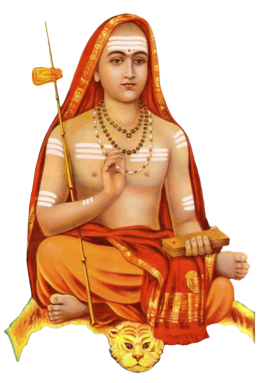फलोदयः क्रियापूर्वो निष्क्रियो न हि कुत्रचित् ॥ ४४६ ॥
phalodayaḥ kriyāpūrvo niṣkriyo na hi kutracit || 446 ||
सञ्चितं विलयं याति प्रबोधात्स्वप्नकर्मवत् ॥ ४४७ ॥
sañcitaṃ vilayaṃ yāti prabodhātsvapnakarmavat || 447 ||
सुप्तोत्थितस्य किं तत्स्यात्स्वर्गाय नरकाय वा ॥ ४४८ ॥
suptotthitasya kiṃ tatsyātsvargāya narakāya vā || 448 ||
न श्लिष्यति च यत्किंचित्कदाचिद्भाविकर्मभिः ॥ ४४९ ॥
na śliṣyati ca yatkiṃcitkadācidbhāvikarmabhiḥ || 449 ||
तथात्मोपाधियोगेन तद्धर्मैर्नैव लिप्यते ॥ ४५0 ॥
tathātmopādhiyogena taddharmairnaiva lipyate || 450 ||
अदत्वा स्वफलं लक्ष्यमुद्दिश्योत्सृष्टबाणवत् ॥ ४५१ ॥
adatvā svaphalaṃ lakṣyamuddiśyotsṛṣṭabāṇavat || 451 ||
न तिष्ठति छिनत्येव लक्ष्यं वेगेन निर्भरम् ॥ ४५२ ॥
na tiṣṭhati chinatyeva lakṣyaṃ vegena nirbharam || 452 ||
सम्यग्ज्ञानहुताशनेन विलयः प्राक्षंचितागामिनाम् ।
ब्रह्मात्मैक्यमवेक्ष्य तन्मायातया ये सर्वदा संस्थिताः
तेषां तत्त्रितयं नहि क्वचिदपि ब्रह्मैव ते निर्गुणम् ॥ ४५३ ॥
samyagjñānahutāśanena vilayaḥ prākṣaṃcitāgāminām |
brahmātmaikyamavekṣya tanMāyātayā ye sarvadā saṃsthitāḥ
teṣāṃ tattritayaṃ nahi kvacidapi brahmaiva te nirguṇam || 453 ||
and in Sloka 463, and reasons for this view are set forth in Sloka 454 et seq. We may add in passing that we have here the boldest pronouncement of the exalted status of a man of realisation, who is affected by nothing whatsoever in creation.
ब्रह्मात्मनैवात्मनि तिष्ठतो मुनेः ।
प्रारब्धसद्भावकथा न युक्ता
स्वप्नार्थसंबन्धकथेव जाग्रतः ॥ ४५४ ॥
brahmātmanaivātmani tiṣṭhato muneḥ |
prārabdhasadbhāvakathā na yuktā
svapnārthasaṃbandhakatheva jāgrataḥ || 454 ||
देहोपयोगिन्यपि च प्रपञ्चे ।
करोत्यहन्तां ममतानिदन्तां
किन्तु स्वयं तिष्ठति जागरेण ॥ ४५५ ॥
dehopayoginyapi ca prapañce |
karotyahantāṃ mamatānidantāṃ
kintu svayaṃ tiṣṭhati jāgareṇa || 455 ||
न संग्रहस्तज्जगतोऽपि दृष्टः ।
तत्रानुवृत्तिर्यदि चेन्मृषार्थे
न निद्रया मुक्त इतीष्यते ध्रुवम् ॥ ४५६ ॥
na saṃgrahastajjagato’pi dṛṣṭaḥ |
tatrānuvṛttiryadi cenmṛṣārthe
na nidrayā mukta itīṣyate dhruvam || 456 ||
सदात्मना तिष्ठति नान्यदीक्षते ।
स्मृतिर्यथा स्वप्नविलोकितार्थे
तथा विदः प्राशनमोचनादौ ॥ ४५७ ॥
sadātmanā tiṣṭhati nānyadīkṣate |
smṛtiryathā svapnavilokitārthe
tathā vidaḥ prāśanamocanādau || 457 ||
नानादेरात्मनो युक्तं नैवात्मा कर्मनिर्मितः ॥ ४५८ ॥
nānāderātmano yuktaṃ naivātmā karmanirmitaḥ || 458 ||
तदात्मना तिष्ठतोऽस्य कुतः प्रारब्धकल्पना ॥ ४५९ ॥
tadātmanā tiṣṭhato’sya kutaḥ prārabdhakalpanā || 459 ||
देहात्मभावो नैवेष्टः प्रारब्धं त्यज्यतामतः ॥ ४६0 ॥
dehātmabhāvo naiveṣṭaḥ prārabdhaṃ tyajyatāmataḥ || 460 ||
अध्यस्तस्य कुतः सत्त्वमसत्यस्य कुतो जनिः
अजातस्य कुतो नाशः प्रारब्धमसतः कुतः ॥ ४६१ ॥
adhyastasya kutaḥ sattvamasatyasya kuto janiḥ
ajātasya kuto nāśaḥ prārabdhamasataḥ kutaḥ || 461 ||
तिष्ठत्ययं कथं देह इति शङ्कावतो जडान् ॥ ४६२ ॥
समाधातुं बाह्यदृष्ट्या प्रारब्धं वदति श्रुतिः ।
न तु देहादिसत्यत्वबोधनाय विपश्चिताम् ॥ ४६३ ॥
tiṣṭhatyayaṃ kathaṃ deha iti śaṅkāvato jaḍān || 462 ||
samādhātuṃ bāhyadṛṣṭyā prārabdhaṃ vadati śrutiḥ |
na tu dehādisatyatvabodhanāya vipaścitām || 463 ||
एकमेवाद्वयं ब्रह्म नेह नानास्ति किंचन ॥ ४६४ ॥
ekamevādvayaṃ brahma neha nānāsti kiṃcana || 464 ||
Vivekachudamani – Introduction
1: Devoted Dedication
2: Glory of Spiritual Life
3: Unique Graces in Life
4-7: Miseries of The Unspiritual Man
8-13: Means of Wisdom
14-17: The Fit Student
18-30: The Four Qualifications
31: Bhakti – Firm and Deep
32-40: Courtesy of Approach and Questioning
41-47: Loving Advice of the Guru
48-49: Questions of the Disciple
50: Intelligent Disciple – Appreciated
51-55: Glory of Self-Effort
56-61: Knowledge of the Self-Its Beauty
62-66: Direct Experience – Liberation
67-71: Discussion on Questions Raised
72-75: Gross Body
76-82: Sense Objects a Trap – Man Bound
83-86: Fascination for Body Criticised
87-91: Gross Body Condemned
92: Organs of Perception and Action
93-94: Inner Instruments
95: The Five Pranas
96-101: Subtle Body – Effects
102: Functions of Prāna
103-105: Ego Discussed
106-107: Infinite Love – the Self
108-110: Māyā – Pointed Out
111-112: Rajoguņa – Nature and Effects
113-116: Tamoguņa – Nature and Effects
117-119: Sattvaguņa – Nature and Effects
120-121: The Causal Body – Its Nature
122-123: Not-Self – Description
124-135: The Self – Its Nature
136: Advice for Self-control
137-142: What is Bondage – The Reply
143-144: The Powers – Agitation and Veiling
145-146: Bondage in Action
147-153: Ātman and Anātman – Discrimination
Negation of the Kośas
154-164: – Annamaya kośa (Food sheath)
165-166: – Prņamaya kośa (Vital air sheath)
167-183: – Manomaya kosa (Mental sheath)
184-188: – Vijnanamaya kośa (Intellectual sheath)
189-191: Ātman – Unattached
192-193: What is Liberation? – Disciple
194-206: Self-Knowledge gives Liberation
207-210: Anandamaya kośa (Bliss sheath)
211: Ātman – Other than the Five Kośas
212: What is Ātman? – Disciple
213-225: Nature of the Self – Discussion
226-236: All Manifestation Absolute
237-240: Brahman – Its Nature
241-249: That Thou Art – Explanation
250-253: Attitude in Meditation
254-266: Aids to Meditation
267-276: Give up Vāsanās – the Method
277-292: End Superimposition – The Means
293-297: The Perceived I’ Factor – False
298-309: Condemnation of the Ego
310-319: Actions, Thoughts and Vāsanās – Renounce
320-329: Total Vigilance – Its Price
330-338: In the One, No Plurality
339-348: Spiritual Growth – the Secret
349-353: Cause-Effect – False
354-372: Samadhi – Its Nature
373-378: Fully Detached – Samadhi Easy
379-383: Meditation – the Technique
384-397: Continuous Attention to Self
398-406: No Diversity in Reality
407-413: Ātma-vicāra – Contemplation
414-418: Give up Perceptions
419-425: The Science of Reality – Its Benefits
426-445: Signs of a Realised Seer
446-464: Prārabdha for a Saint
465-471: There is No Plurality
472-479: Experience of Selfhood
480-520: Practice of Knowledge – Disciple
521-575: Final Words of Advice
576-578: Blessed Disciple Liberated
579-581: The Glory of the Textbook

Vivekachudamani – Verses 446-464 – Vivekachudamani Verses 446-464 – By Adi Sankaracharya – In Sanskrit with English Meaning, Transliteration, Translation, Commenary, Lyrics, Audio – Vivekachudamani-446-464
